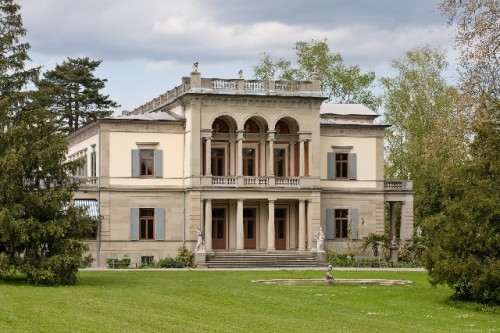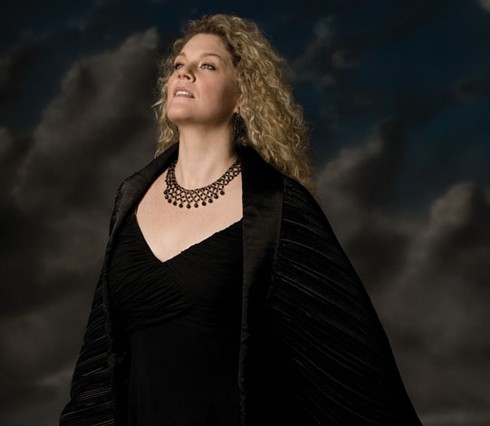The MET Orchestra at Carnegie
Slow Flows the Don Under Semyon Bychkov
By: Susan Hall - Oct 17, 2012
The MET Orchestra at Carnegie Hall
Slowly Flows the Don
The MET Orchestra
Semyon Bychkov, Conductor
Michelle DeYoung, Mezzo-Soprano
WAGNER Overture to Tannhäuser
WAGNER Wesendonck Lieder (orch. Mottl/Wagner)
R. STRAUSS Eine Alpensinfonie
Carnegie Hall
October 14, 2012
The Met Orchestra returned to Carnegie Hall for the first of three annual concerts. Semyan Bychkov conducted. He is currently conducting Otello at the Metropolitan Opera and is world famous as a Wagner and Strauss specialist.
The interesting tempi on display in Otello were evident at Carnegie too. Bychkov is not afraid to serve up his music slow to reveal all the intricate details of composers he has studied deeply. Occasionally at the opera house, a singer like Falk Struckmann will pull him along at a quicker pace, but Renee Fleming thoroughly enjoyed her measured presentation of Desdemona’s final act prayer, which was exquisitely presented by both conductor and artist.
Bychkov’s approach is unusual, capturing your ear by surprise. Favoring lovely long lines and a controlled dynamic approach, Bychkov swoops his arms in long, loving gestures. In taking his time, often-overlooked details are splendidly on display.
The orchestra’s extremely spacious performance of the Tannhauser overture climaxed in the comfortingly familiar Pilgrim's Chorus. Yet the music was powerful even in its quiet presentation. Setting the stage for the opera Tannhauser, one wished it would go on and on.
Bychkov’s relationship with the Metropolitan Opera Orchestra is a work in progress. Perhaps his considered looks at familiar music take time to ingest.
Michelle DeYoung stepped in for an ailing soprano, and sang the five Wesendonck/Wagner love songs in her lush, dramatic mezzo. Off book, even at the last moment, she is a large stage presence, often cupping her lines in her hands, and looking to the heavens for guidance. Her lower voice was particularly moving, rich in vocal contrast. She captured the mood of these love songs in her powerful delivery. DeYoung is a generous and perceptive singer.
Delicious hints of Tristan-to-come were apparent in the orchestration and the DeYoung interpretation. Even in a hall as large as Carnegie, the songs were intimate, a conversation between our beautiful muse for the afternoon and her audience. Bychkov’s impassioned conducting brought cohesion and shape to the orchestration.
Bychkov then played Richard Strauss' last tone poem, a climb in the Alps, creating a view over Swiss valleys, the orchestra at its peak. The conductor took his time, but the orchestra never dragged. Bychkov found a delightful balance between measured, rich orchestral playing and occasional flights of fanciful sound.
Wagner, Byron, Shelley, Marx and Lenin among others found the Swiss mountain air clarifying. The symphony is a ‘recherche du temps perdu" look back. The 47 year old Strauss takes a Proustian glance at an Alpine hike he took when he was fouteen. Its vision may be best presented through the mists of time. While Bychkov’s interpretation had grandeur and an almost seamless flow, we looked through an even-tempered hike.
The orchestra played with a propulsive drive and subtle illumination. Bychkov clearly drew an arch over the entire work. Climaxes were rare, but all the more powerful when they came.
The orchestra gave us the architectural shape,but also delicious details: The piccolo’s birds, the swish of mountain air. The clarinets and trumpets burst forth, majesty blaring from the night, sometimes exposed solo, at others mixed with buzzing, but always beautiful strings.
Bychkov catches your ear with his unexpected takes, both in pacing and in revealing both whispered phrases and roars as he moves through the 22 sections of the Alpine, in which the young Strauss climbs up a mountain and then down.
Throughout the afternoon we were given musical fanfare, but also minute insights into the glorious music of Wagner and Strauss.
The Alpine symphony ends with unusually long moments of silence for which Carnegie Hall is a perfect setting.




